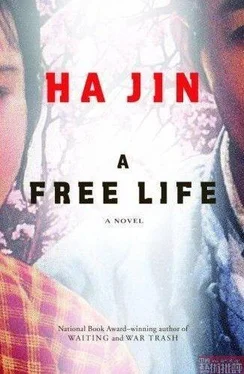His brother, the youngest in the family, had always been the baby and didn't have the strength to grapple with fortune in a foreign land.
Ning sighed. "I don't see any meaning in my life here. My job makes me go to parties almost every night. I hate alcohol but have to guzzle it, to get drunk a few times a week, or others would think I'm dishonest. I'm sick of this kind of life, sick of having to smile at the people I don't like to meet, sick of attending banquets at which I have to blab like a windbag. I want to go abroad for some peace and quiet."
" At least you have many friends here," Nan said. "Our life in America is very solitary. It would be hard for you to endure a lonely existence in Australia."
"I'm not afraid of loneliness, which is better than hopelessness. This place is totally ruined. You should see what it's like here in the winter-the smog is so thick that sometimes even the sun has changed its color, and whenever you go out, you have to wear a surgeon's mask, or your nose will be blocked by soot. I don't know if you've noticed that millions and millions of Chinese have lung problems, because China has no lungs anymore-all the forests are gone. Worst of all, there are lots of criminals roaming around. Too many people have lost jobs and are desperate to get along by any means. A colleague of mine was stabbed last spring under the bridge right outside our office building, because he didn't have enough cash on him for the mugger. In this place it's impossible to live honestly-you have to lie constantly because everyone else lies. If you don't, others will take advantage of you. In the marketplace more than half the scales are crooked. Our neighbor, Aunt Niu, bought a sack of sweet rice dumplings from a peddler one evening last January, but when she got home she found they were actually frozen donkey droppings. A friend of mine, a policeman, lost his marriage because he returned to the owner a full envelope of cash he'd picked up on a bus. His wife called him 'mental,' and even his parents-in-law said he was a dope."
"Look at it this way, Ning. You're almost thirty-five and don't speak any English. Even if you're lucky and get to Australia eventually after spending a fortune, it will take several years for you to settle down. In a foreign country it's almost impossible to restart your life once you're past forty, unless you have a lot of money or extraordinary talent. The struggle is too overpowering and can drive you out of your mind. Ning, you must think carefully before you decide to go to Australia. To my mind, you belong to this place. At least you have a comfortable job here and people respect you as a reporter."
"Actually, Minyan wants to go abroad more than myself. She's been attending a night school to learn English."
"I see. Think twice before you make up your mind, will you?" "I will."
A man began bellowing a folk song from a rowboat up the bank. A freight train blew its whistle, trundling across the dark, old bridge downstream built by the Japanese more than half a century ago. Numerous lights were already on, flickering lazily on the river. A moment later the two brothers turned back, each wheeling his bicycle with one hand on the handlebar. On their way home Nan gave Ning three hundred dollars and made him promise to let his wife keep the money.
NAN gave the same amount of cash to his sister, Ying, who didn't really need the money since her husband owned a profitable landscaping company. But the dollars were a hard currency, which pleased her.
Nan told his parents not to buy braised chicken or fresh fish for him because he ate those things every day in America. He just wanted homely food, like millet porridge, cornmeal gruel, plain noodles with soy paste, fried toon leaves. These things were easy to make. His mother didn't even have to go to the marketplace to buy anything. His aunt, living in the countryside and having four toon trees in her backyard, would mail his parents a large sack of the leaves every spring. Although Nan had missed these foods, he didn't enjoy them as much as he had expected. Somehow everything tasted different from what he'd remembered. Maybe he'd lost some taste buds. Or maybe all the memories of those toothsome foods were just the remaining sensations of his childhood.
The next afternoon he and his mother were at home alone. His father had gone to a memorial service held for a former colleague of his who had just passed away. Putting a clay pot of chrysanthemum tea on the side table for Nan, his mother sat down and sighed.
"What's wrong?" he asked.
"I miss Taotao."
This was strange, because Nan remembered that she had never liked her eldest grandson and had once even refused to watch over the boy when he and his wife had to attend a meeting together. For that Pingping still held a grudge against her. Nan told his mother, "Don't worry about him. He's fine. He's a stellar student and will have a good future." "I want to see him."
"All right, I'll talk to Pingping and see if we can bring him back next summer. That way he can learn some Chinese from you and my dad. "
"No, I want to go to America to see him and Pingping." "Why do you have to go yourself? At your age it's not safe to travel that far."
"Why? I'm not that old." True, she had just turned sixty-five. "I'll try to send Taotao back to stay with you next summer, all right?"
" I want to see America myself. "
" Mom, you have a very comfortable life here. If you fall ill there, you could die abroad. Don't you have arteriosclerosis and dizzy spells?"
"I'm well now, and I'd like to see America before I die." "Truth be told, for old people life there is harder than here." "I don't mind. I can work." "Work, at your age?"
"Yes, there's no shame in working. Everybody knows how easy it is to make money in America. After you gave us the cash the day before yesterday, your dad said to me, 'Damn, we've never had so much money in our whole life. See how easy it was for Nan to toss out a thousand dollars. In just twelve years he has become such a rich man.' My son, you know, that amount you gave us is enough for us to live on for a whole year."
"We make more there but have to spend more too."
"Don't you own a restaurant?"
" Yes, I do. "
" I can work for you. I can make dumpling wrappers, wonton wrappers, noodles, all kinds of buns and pies. For five dollars an hour I can earn forty a day. In a year that'll be more than ten thousand, enough for your dad and me to spend in our remaining years. Nan, I'll stay with you just a year and then I'll come back. Please take me to America."
"How about my dad in the meantime?"
"He'll stay home."
"But he can't cook."
"He can always hire a maid."
Nan realized that his father wouldn't go because he had many friends here, because he could play mah-jongg every night, and also because he'd have to be around to collect their pensions and take care of this home. Nan said, "I'll have to talk with Pingping about this. I can't decide by myself."
His mother's face dropped and a few folds appeared on her throat. She said, "Who's the boss in your home? If you insist on your right as her husband, of course Pingping will obey you."
"Mom, I can't do that. She owns half the business too. We two are partners, like a team."
She seemed to intuit that Pingping wouldn't let her come to America because the two of them had never gotten along. She sighed and went on in a flat voice, "You're not your old self anymore. Having your wife, you no longer need your old mother, the same as your brother and sister. Heartless. Every one of you is heartless." She pursed her lips, her nose crinkled.
Nan wanted to say, "Where were you when Pingping suffered and struggled with me all these years? Did you ever weep with me when we lost our baby? Were you ever worried when we couldn't pay our bills? You only know how to take advantage of us and ask for money. Greedy. Both of you are greedy." But he held his tongue, lowered his eyes, and muttered, "Mother, you don't know how hard life has been for Pingping and me. If she were another woman, she'd have walked out on me long ago. She's the mainstay of our family."
Читать дальше












